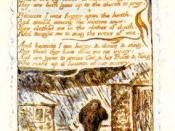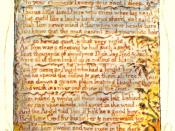William Blake
The Chimney Sweeper
The Chimney Sweeper is set against the dark background of child labour that was prominent in England in the late 18th and 19th Century. It gives hints into Blake's thoughts, both pessimistic and optimistic, on the world around him and in the last stanza in particular that worlds relationship with God. Curiously, the poem insinuates that through work we may find redemption, which seems to contradict the main thrust of the poem. When Blake himself was young he claimed to have seen visions of God and angels and we can see this very specific imagery in the Chimney Sweeper. Blake seems to be struggling himself with his religious ideas. The contradiction between his belief in God and the world around him shines through in this poem.
Blake puts a bold and raging tone in his first sentence "when my mother died" and in addition "my father sold me" further showing Blake's need to bring out the pain and suffering of the children and sweepers during this period of time.
The poem goes at a terrific pace, a curious choice for a poem this somber. It does however give the impression that the poem is written by a child, or at least an adult who had the experience that Tom went through. Evidence of this can be seen in Blakes introduction of the first person when Tom receives the advice about his hair. The adding of the dream of Tom adds more mystery and intrigue with the introduction of the "Angel" and "God" to scrutinize the plight of the young sweepers during the 1700's.
During the sweepers time many were very young which Blake describes in the line "And my father sold me while yet my tongue could scarcely cry 'weep! 'weep! 'weep! 'weep!" These two...


